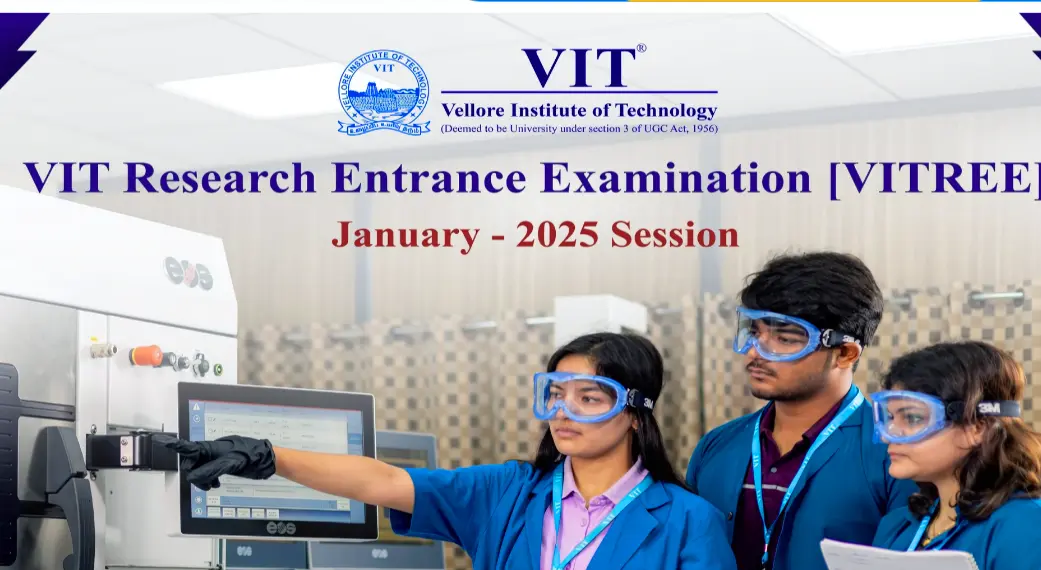VITREE 2025 Syllabus: The Vellore Institute of Technology (VIT) Research Entrance Examination (VITREE) for the January 2025 session is designed to assess the research aptitude of candidates aiming to pursue Ph.D. and Direct Ph.D. programs. A thorough understanding of the syllabus is essential for effective preparation. VITREE’s structure comprises a blend of technical knowledge, communication skills, and statistical aptitude, varying slightly depending on whether the candidate is applying for a Ph.D. or a Direct Ph.D.
Common Syllabus Components for Ph.D. and Direct Ph.D. Programs
Both the Ph.D. and Direct Ph.D. programs have specific sections focusing on English communication skills and, for Ph.D. candidates, statistics and probability. Additionally, candidates must demonstrate strong technical expertise in their chosen fields.
Check Also: VITREE 2025 Test Cities
Besides, the Ph.D. candidates’ examination also encompasses a statistics and probability section. This part shall cover the basic statistical methods of classification, data, measurement of central tendency-mean, median, and mode-dispersion-variance, standard deviation. Moreover, the laws of probability, correlation and regression, and probability distribution-binomial and Poisson inclusive shall be discussed.
The following table provides a quick overview of the sections and question distribution for both programs:
| Program | Sections | Number of Questions |
|---|---|---|
| Ph.D. | – Technical Knowledge | 70 |
| “ | – English Communication Skills | 15 |
| “ | – Statistics and Probability | 15 |
| Direct Ph.D. | – Technical Knowledge | 80 |
| “ | – English Communication Skills | 20 |
Check Also: VITREE 2025 Test Cities
Subject-Specific Syllabus for Ph.D. Candidates
Technical Knowledge Section: It varies as per the research field the candidate chooses. For instance, in programs such as Physics, Chemistry, Mathematics, Computer Science & Engineering, Civil Engineering, and Biotechnology, aspirants have to prepare for different specific topics that come under their discipline. The summary of the syllabus for some major fields is given below:
| Subject | Key Topics |
|---|---|
| Physics | Mathematical methods, classical mechanics, electromagnetism, quantum mechanics, electronics, condensed matter physics, nuclear physics. |
| Chemistry | Physical chemistry (thermodynamics, kinetics), inorganic chemistry (bonding, coordination compounds), organic chemistry (stereochemistry, reaction mechanisms), spectroscopy. |
| Mathematics | Algebra, analysis, differential equations, numerical methods, probability, statistics, linear programming. |
| Computer Science & Engineering | Algorithms, data structures, theory of computation, operating systems, computer architecture, databases, software engineering, programming languages. |
| Civil Engineering | Structural analysis, geotechnical engineering, water resources, environmental engineering, transportation engineering. |
| Biotechnology | Molecular biology, genetics, immunology, microbiology, bioinformatics, biochemistry, cell structure and function, industrial biotechnology. |
This list is a brief overview of the subjects covered in VITREE 2025. Candidates are encouraged to refer to the detailed syllabus available on the official VIT website to ensure comprehensive preparation for their chosen discipline.
Additional Information and Resources
The exam is conducted entirely in English, and the technical section’s content will vary based on the specific research area selected by the candidate. While the English and statistics sections remain common, the technical portion requires candidates to delve deeply into their field of study.
For more detailed information, candidates can access the full syllabus and guidelines using the links below:
- Complete Syllabus: Download here
- Information Brochure: Click here
Visit the TSWREIS homepage to find the information you need.


